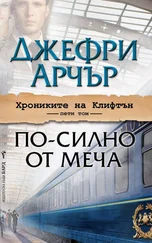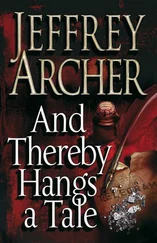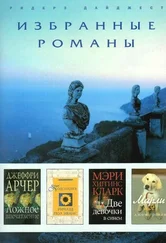It was exactly ten-thirty when Miss Tredgold went down to the kitchen to make her nightly cup of cocoa before retiring. On returning she heard what sounded like a chant. She tiptoed slowly to Florentyna’s bedroom door and stood alert, listening to the firmly whispered words: ‘One, Washington; two, Adams; three, Jefferson; four, Madison.’ She went through every President without a mistake. ‘Thirty-one, Hoover; thirty-two, FDR; thirty-three, Unknown; thirty-four, Unknown; thirty-five, thirty-six, thirty-seven, thirty-eight, thirty-nine, forty, forty-one, Unknown; forty-two...’ There was a moment’s silence, then: ‘One, Washington; two, Adams; three, Jefferson...’ Miss Tredgold tiptoed back to her room and lay awake for some time staring at the ceiling, her untouched cocoa going cold beside her as she recalled her father’s words: ‘You were born to be a teacher and the Lord’s plan takes us all in its compass; perhaps you will teach someone of destiny.’ The President of the United States, Florentyna Rosnovski? No, thought Miss Tredgold, Florentyna was right: she would have to marry someone with a simple name.
Florentyna rose the next morning, bade Miss Tredgold bonjour and disappeared into the bathroom. After feeding Eleanor, who now seemed to eat more than she did, Florentyna read in the Chicago Tribune that FDR and Churchill had conferred on the unconditional surrender of Italy and told her mother joyfully that that meant Papa would be home soon.
Zaphia said she hoped she was right and commented to Miss Tredgold how well she thought Florentyna was looking. ‘And how did you enjoy Washington, my dear?’
‘Very much, Mama. I think I’ll live there one day.’
‘Why, Florentyna, what would you do in Washington?’
Florentyna looked up and met Miss Tredgold’s eyes. She hesitated for a few seconds and then turned back to her mother. ‘I don’t know, I just thought Washington was a nice city. Would you please pass the marmalade, Miss Tredgold?’
Florentyna couldn’t be sure how many of her weekly letters were reaching her father because they had to be mailed to a depot in New York for checking before they were sent on to wherever Major Rosnovski was stationed at the time.
The replies came back spasmodically, and sometimes Florentyna would receive as many as three letters in one week and then no word for three months. If a whole month passed without a letter, she began to believe her father had been killed in action. Miss Tredgold explained that that was not possible since the army always sent a telegram to inform a family if a relative was killed or missing. Each morning, Florentyna would be the first to go downstairs to search through the mail for her father’s handwriting or the dreaded telegram. When she did receive a letter from her father she often found that some of the words were blocked out with black ink. She tried holding them up to the light over the breakfast table but still she couldn’t decipher them. Miss Tredgold told her that this was for her father’s own safety, as he might inadvertently have written something that could be useful to the enemy if the letter fell into the Wrong Hands.
‘Why would the Germans be interested in the fact that I am second in geometry?’ asked Florentyna.
Miss Tredgold ignored the question and asked if she had enough to eat.
‘I’d like another bit of toast.’
‘A piece, child, a piece. A bit is something you put in a horse’s mouth.’
Every six months Miss Tredgold would take her charge, accompanied by Eleanor, to Monroe Street to sit on a high stool with the dog on a box by her side, to smile at a flashbulb so that Major Rosnovski could watch his daughter and the Labrador grow up by photograph.
‘We can’t have him not recognizing his only child when he returns home, can we?’ she declared.
Florentyna would print her age and Eleanor’s age in dog years firmly on the back of each photo and in a letter add the details of her progress at school, how she enjoyed tennis and swimming in the summer and volleyball and basketball in the winter, also how her bookshelves were stacked with his old cigar boxes full of butterflies caught in a wonderful net that Mama had given her for Christmas. She added that Miss Tredgold had carefully chloroformed the butterflies before she pinned them and identified each one with its Latin name. How her mother had joined some charity committee and started taking an interest in the Polish League for Women. How she was growing vegetables in her victory garden, how she and Eleanor didn’t like the meat shortage but that she liked bread-and-butter pudding, while Eleanor preferred crunchy biscuits. She always ended each letter the same way: ‘Please come home tomorrow.’
The war stretched into 1944, and Florentyna followed the progress of the Allies in the Chicago Tribune and by listening to Edward R. Murrow’s reports from London on the radio. Eisenhower became her idol and she nursed a secret admiration for General George Patton because he seemed to be a little bit like her father. On the sixth of June, the invasion of Western Europe was launched. Florentyna imagined that her father was on the beachhead and she was unable to understand how he could possibly hope to survive. She followed the Allies in their drive toward Paris on the map of Europe that Miss Tredgold had pinned to the playroom wall during the days of her lessons in Polish history. She began to believe that the war was at last coming to an end and that her father would soon return home.
She took to sitting hour after hour on the doorstep of their house on Rigg Street with Eleanor by her side, watching the corner of the block. But the hours turned into days, the days into weeks, and Florentyna only became distracted from her vigil by the fact that both Presidential conventions were to be held in Chicago during the summer vacation, which gave her the opportunity to see her political hero in person.
The Republicans chose Thomas E. Dewey as their candidate in June, and later in July the Democrats again selected Roosevelt. Congressman Osborne took Florentyna along to the Amphitheater to hear the President make his acceptance speech to the convention. She was puzzled by the fact that whenever she saw Congressman Osborne, he was accompanied by a different woman. She must ask Miss Tredgold about that; she would be sure to have an explanation. After the candidate’s speech, Florentyna stood in a long line waiting to shake hands with the President, but she was so nervous that she didn’t look up as he was wheeled by.
It was the most exciting day of her life, and on the walk home she confided her interest in politics to Congressman Osborne. He did not point out to her that despite the war there wasn’t a woman sitting in the Senate, and there were only two women in Congress.
In November, Florentyna wrote to her father to tell him something she imagined he hadn’t heard. FDR had won a fourth term. She waited months for his reply.
And then the telegram came.
Miss Tredgold could not extract the missive before the child spotted the small buff envelope. The governess immediately carried the telegram to Mrs. Rosnovski in the drawing room with a trembling Florentyna following in her wake, holding on to her skirt, with Eleanor a pace behind them. Zaphia tore the envelope open with nervous fingers, read the contents, and burst into hysterical tears. ‘No, no,’ Florentyna cried, ‘it can’t be true, Mama. Tell me he’s only missing,’ and snatched the telegram from her speechless mother to read the contents. It read: ‘DEMOB PAPERS ISSUED. HOME SOONEST. LOVE ABEL.’ Florentyna let out a whoop of joy and jumped on the back of Miss Tredgold, who fell into a chair that normally she would never have sat in. Eleanor, as if aware the usual codes could be broken, also jumped on the chair and started licking both of them while Zaphia burst out laughing.
Читать дальше
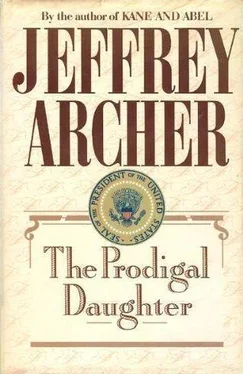

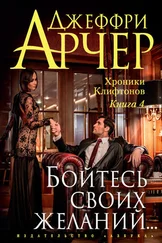
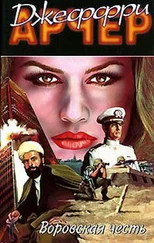
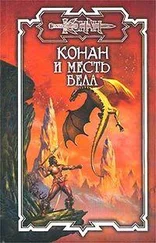
![Джеффри Арчер - The Short, the Long and the Tall [С иллюстрациями]](/books/388600/dzheffri-archer-the-short-the-long-and-the-tall-s-thumb.webp)

